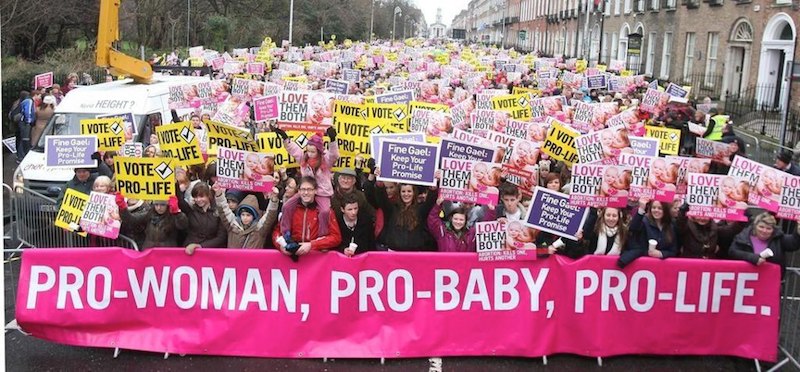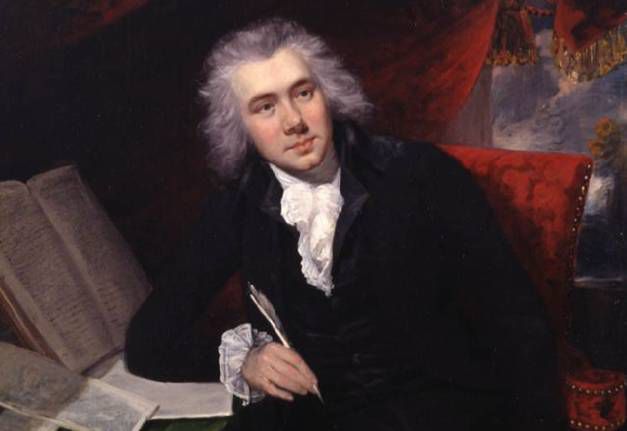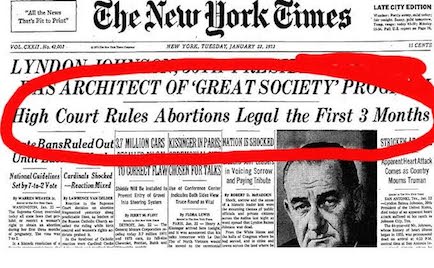Quick Apology: Abortion, a matter of law?

Last year I posted on Facebook that I was at the March For Life in Washington DC and a lively Facebook thread ensued among my friends concerning my pro-life position. Last year I wrote a couple of posts in response, but got distracted and cut short the series (Seriously, I have ADD when it comes to blog series!).
This year I’ve been writing a new series of posts on the subject of abortion and today I would like to address one of the comments written by a friend of mine in the format of a “Quick Apology“.

Objection
Last year, one of the objections raised was as follows:
“If something is not illegal it is not democratic to try to prevent people from going about legal (if unpleasant) activities”.
Below I’d like to give a rough outline of my reply.
Response
I’m afraid the logic put forward here escapes me. It seems that my friend is saying that it’s undemocratic to try and make illegal something that’s currently legal!
Problematic Example #1: Abolition of slavery
I wonder if my friend would feel the same if the issue being discussed were slavery. There was a time when slavery was legal. Were the actions of William Wilberforce and the other abolitionists “not democratic” when they attempted to “prevent people from going about legal (if unpleasant) activities”?

Were Wilberforce and the others wrong to try to “force their beliefs onto others” concerning human equality?
Problematic Example #2: Roe vs. Wade
There is another problem with this objection. At one point in the not-too-distant past, abortion was illegal. When pro-choice advocates fought to overturn this law, were they being “not democratic”?
 It seems to me that a double standard is present in the objection. Surely the very fact that we’re in a democracy means that the people should be able to bring about changes in the law?
It seems to me that a double standard is present in the objection. Surely the very fact that we’re in a democracy means that the people should be able to bring about changes in the law?
Forcing our beliefs
I’ve heard some people say that, if abortion were made illegal, it would impose a particular ideology on the population, women specifically. However, at the moment, we have a different issue, in that the law forces its view upon the unborn children!
The law can’t be neutral on the subject of abortion. It is either going to say that the unborn should be protected, or it will deny them that right to life.
I have a dream too!
I’ve heard some people complain about pro-life apologetics, saying that they don’t work. That’s not true though, some people do change their minds on this subject This is the purpose of reasoned discussion.
It is the entire point of the pro-life movement to change the minds of those who think that abortion is acceptable in a civilized society. It begins with changed minds and will end in changed legislation. As noted above, Pro-choice advocates did it in the seventies…pro-life advocates are trying to do the same in 2015.
Since it was Martin Luther King Day yesterday, I’d like to end with a quotation from the man himself which demonstrates the importance of seeking legal reform. We begin with changing people’s minds, but we aim to enshrine it in law so that the lives of the unborn will be protected…

” It seems that my friend is saying that it’s undemocratic to try and make illegal something that’s currently legal!”
You are mistaken. I think your friend is saying it is undemocratic to try and prevent people from doing something (however repugnant to you it might be) that is legal. That isn’t the same as saying you cannot fight to make the presently legal thing illegal. I’ve no objection to that effort at all. I think in the case of abortion it is futile — our efforts are better spent trying to help people remain ‘uninseminated’, so to speak. There are soooooo many avenues towards that goal, and all of them worthy.
How is that different from saying that “it’s undemocratic to try and make illegal something that’s currently legal!”? The only difference as far as I can see is that I’m trying to use the law to stop him, rather than just talking with every person who is seeking an abortion.
If the speed limit in my street is too high, resulting in many deaths, I might hold up signs warning people as they are heading down the dangerous road. That might help to a degree. However, I might also seek to have the speed limit reduced legally, a much more effective strategy.
It is different because making something illegal is accomplished in legislatures. You may stop behaviors or actions through protesting, but you only change the laws by passing new ones.
Why is it futile? The United States didn’t previously kill 1.37 million unborn children every year. The current situation is extremely recent. America’s conscience can be revived and the rulings can be reversed.
Is abortion the killing of an unborn or not? If it is, a civilized society shouldn’t allow it, regardless of other social programmes which may be perused. Imagine I lived in the 18th Century and wanted to fight against slavery, I might work hard to alleviate the things which drove people to purchase slaves, but I would be crazy if I didn’t also strive to make the entire barbaric practice illegal.
But let’s say we went the road you were suggesting. Let’s say we initiated a massive contraception programme (even though vast sums of money have already been poured into similar programmes)…
What will someone do when the contraception inevitably fails? After cultivating a society which separates babies as a natural consequence of sex, do you think a couple is more or less likely to have an abortion? Here is how Planned Parenthood themselves argued…
“In some critical respects abortion is of the same character as the decision to use contraception… for two decades of economic and social developments, people have organized intimate relationships and made choices that define their views of themselves and their places in society, in reliance on the availability of abortion in the event that contraception should fail“
– 1992 Casey vs. Planned Parenthood?
I think it is only possible to answer the question “is abortion the killing of an unborn or not” if there is agreement on when a fetus is a human. If your interlocutor does not agree with the premise, it will not lead to a productive discussion. Clearly an abortion is the termination of a pregnancy — that much is a physiological fact. The question of killing and humans is of a different order.
I did not go into any details on keeping women from becoming inseminated, but I think of this in a very very broad way. So, I fully subscribe to the religious/moral/spiritual leg in any effort. In no way to do I think contraception alone will solve the problem. In fact, I can think of very few well intentioned efforts that I would not support. Poverty reduction? Absolutely! Better and more equal education? Yes! Anything that will support healthy families? Of course! Moral and ethical training for children, teens, adults? Double of course!
Well, case closed then! The word “fetus” is a Latin word which means “offspring”/”little one”. It simply denotes a stage of development (much like toddler and teenager) in a human being.
What is a pregnancy? It is when the offspring of a male human and female human is living and growing inside the female’s womb. What is the “termination” of a pregnancy? It is the killing of that human creature.
Is it an organism with human DNA? Yes? Then it’s human.
Is it alive after the abortion process? No? Then someone killed it.
That’s great, but I would like to underscore my two main points in this section:
1. If abortion is killing an unborn child, it should be illegal, regardless of whatever social programmes are pursued in an attempt to stop the pregnancy happening in the first place.
2. If you teach people to regard children as a purely optional consequence of sex, are you fostering a society which is going to be more or less inclined to dispose of that child when the contraception fails?